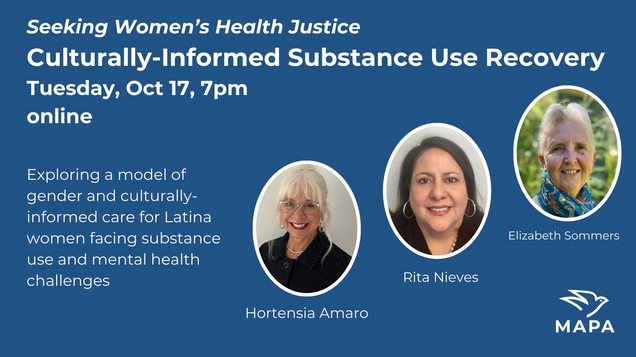October 17: Culturally-informed Substance Use Recovery Webinar
Seeking Women’s Health Justice
Model of gender and culturally-informed care for Latina women facing substance use and mental health challenges
![]() Resources for women in recovery from substance use disorder are challenged by underfunding and under-appreciation of women’s specific needs. The opioid epidemic disproportionately affects women and providing effective and sustainable treatment approaches is imperative.
Resources for women in recovery from substance use disorder are challenged by underfunding and under-appreciation of women’s specific needs. The opioid epidemic disproportionately affects women and providing effective and sustainable treatment approaches is imperative.
For over two decades, Entre Familia, a program in the Boston area, has provided effective and appropriate care and has developed a number of best practices.
Entre Familia offers a 6-to-12-month residential model of treatment that incorporates bilingual and bicultural programming, offering gender-specific approaches to treatment for women who may be pregnant, postpartum, and/or are primary caregivers for their children. Coordinated and comprehensive care is key to supporting women in recovery.
In a culture that prioritizes funding for warfare ($800+ billion to the U.S. military), while spending for human services and needs is inadequate, inhumane and unjust (less than $100 billion), this webinar explores ways to seek health justice for women in recovery.
By becoming informed and activated about women’s health and social issues, we can meaningfully ensure that the intersection of women’s health and peace will be justice.
Speakers:
Hortensia de los Angeles Amaro, PhD, is Distinguished University Professor and Senior Scholar on Community Health at the Herbert Wertheim College of Medicine and the Robert Stemple College of Public Health and Social Work, Florida International University.
Rita Nieves RN, MPH, LICSW is a public health administrator with over 25 years of management experience in developing and providing services to persons with substance use and mental health problems. She has worked both in Puerto Rico and the US in substance use treatment and communicable disease control.
Moderator:
Beth Sommers is affiliated with Boston Medical Center and the BU School of Medicine.
Sponsored by MAPA’s Fund Healthcare, Not Warfare working group
